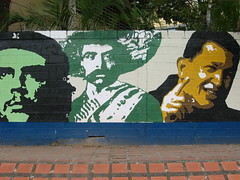Over the past couple of years there have been a number of blogs started by Marxist-Leninist or Maoist bloggers. Unfortunately almost none of the bloggers have been able to maintain a steady stream of new content on as much of a regular basis as we would like. I'm still doing Left Spot blog, but it seems like a good thing to also participate in this multi-blogger blog to see if through 'collectivization' we can get more regular content churning out and inspire each other to write more and better things.
That idea flows nicely into the actual content of this post. Having a multi-blogger blog is one great way to make us more than the sum of our parts within the blogosphere. Another way is to have a group of bloggers all write about a similar theme at the same time. This creates a dialogue across blogs that gives a broader reach than any individual blogger would have. So in that spirit, I am putting forward this call to write and post something inspired by Black Panther Party leader Fred Hampton on December 4, the day he was assassinated in 1969. Read on for details, and leave a comment if you plan to participate. Thanks! --Left Spot
 On December 4, 1969, Chicago Black Panther Party leader Fred Hampton was assassinated as part of the U.S. government's campaign to neutralize the Black Panthers' growing revolutionary influence. Hampton was one of the most dynamic and politically on-point leaders in the Black Panther Party. His death was a huge loss to the BPP, to the Black Liberation Movement, the communist movement and to the revolutionary movement overall in the U.S. Since December 4 is approaching, I'd like to propose that bloggers who are interested should take that day to write and post something inspired by the legacy of Fred Hampton.
On December 4, 1969, Chicago Black Panther Party leader Fred Hampton was assassinated as part of the U.S. government's campaign to neutralize the Black Panthers' growing revolutionary influence. Hampton was one of the most dynamic and politically on-point leaders in the Black Panther Party. His death was a huge loss to the BPP, to the Black Liberation Movement, the communist movement and to the revolutionary movement overall in the U.S. Since December 4 is approaching, I'd like to propose that bloggers who are interested should take that day to write and post something inspired by the legacy of Fred Hampton.It could be something about the politics and legacy of the Black Panther Party; something about Fred Hampton specifically; something about the history or the current state of the Black Liberation Movement or the revolutionary movement in the U.S. in general; Something about how the Black Panthers tried to apply Marxist-Leninist or Maoist politics to the conditions in the U.S. and take out revolutionary politics around mass issues in a way the masses would understand and embrace, etc. Or just make up your own topic.
Almost a year ago (seemingly eons ago in internet-time) way back in January 2007, there was an interesting attempt to have a Blog Against White Supremacy Day on Martin Luther King Day. About 12 or 13 leftist bloggers participated in that and some good and interesting things were written.
I've always been frustrated that Fred Hampton is not better known and that the date of his assassination isn't more widely recognized or commemorated. I don't anticipate that there will be tons of participants in this blogging day, but if even just a few people write something, I think it will be a successful contribution toward the popularizing of Fred Hampton and his outstanding revolutionary spirit.
If you plan to participate, leave a comment here to let folks know.


